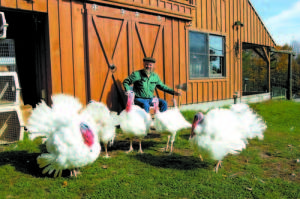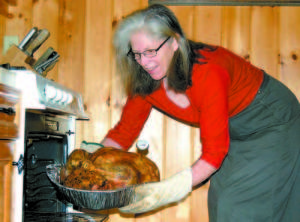Thanking the turkey

Henry Hamilton whets his axe while the turkeys he and his wife Shirley raised from day-old poults wander about the yard.
By Dawn De Busk
Staff Writer
OTISFIELD — An Otisfield couple has an agreement with the free-range turkeys that they raised from day-old poults.
“The turkeys have a contract with us,†Shirley Hamilton said.
“We are going to feed you for six months; and then, you will feed us for six months,†she said.
“I was raised on a farm. We would buy animals, and I would have hard time killing and eating them. The deal was that when you had an animal, you took care of it as best as you could. You are the steward of it. Then, it takes care of you by becoming food on the table,†she said.
“As my grandson says, ‘Farm animals are transformed into meat,’ †she said.
“Thinking of it that way always makes it easier,†she said.
On Monday, Shirley’s husband Henry sharpened his axe, put a pot of water on the outdoor fire pit, and prepared to butcher and dress the last of their eight turkeys.
“We raise all our animals. We let them know when the time comes that we appreciated them,†Henry said.
Most Americans opt to grab their Thanksgiving turkey from the freezer section of the local grocery store. A growing percentage of people take the extra steps to find a farm or a natural food store that can ensure the turkey ranged free and ate organically.
Although farming used to be a way of life in our nation, very few people now-a-days raise their own turkeys for the upcoming Thanksgiving dinner.
Henry has a Master’s Degree in Animal Science and Genetics. Shirley earned her Bachelor’s of Science in Agricultural Economics with a double major in horticulture and animal science.
Together, they operate a small farm on about 35 acres. People can purchase the turkeys, which the couple continues to care for. Then, they help their customers butcher and dress the birds.
This year, some of the turkeys were butchered earlier than planned because they were getting too big to fit in the oven, Henry said.
According to the Hamiltons, flavor plays a factor in that decision for many people.
“The taste: It is much richer. It tastes more like a turkey,†Henry said.

Shirley Hamilton removes from the oven a cooked turkey, which she and her husband raised on their farm. The couple says the turkeys taste much better than store-bought ones; and the flavor of the meat varies from year to year, depending on what plants are most plentiful.
(Photos courtesy of Henry and Shirley Hamilton)
Their turkeys have more flavor “because they free range versus a bird that eats commercial feed,†Shirley said.
“Our turkeys will have a better flavor. The flavor will reflect the natural grasses and bugs they have been eating,†she said.
“If it was raised in say Bosnia, it would taste different,†she said.
“You know how people say, ‘You are what you eat.’ Our turkeys are the same. Their meat will taste like what they have been eating,†Shirley said.
“Our turkeys will have a subtle difference in how they taste every year. Every year is different; the taste reflects the weather,†she said.
Certain plants will be more abundant, depending on whether it was a dry or a rainy season, she said.
“I have heard that commercial turkeys have been fed Twinkies and expired baked goods,†she added.
A stuffing suited for fresh game
With such a delightful flavor, it would be a crying shame to use stuffing from a box. What kind of stuffing best compliments free-range turkey?
According to Henry, his wife’s thanksgiving stuffing reflects the spicy cuisine they were exposed to as humanitarian aides in the Mideast, from Turkey to Pakistan.
Shirley said the spice is derived from crushed red pepper and fresh jalapenos.
“We like spice at this house. Spice is very good for immune system,†she said.
She also adds herbs from the garden such as sage, parsley, and thyme.
“I grow my own onions, too,†she said.
She uses giblet broth for the water, and the uneaten heels of homemade bread for the stuffing.
“The stuffing comes out different every time,†she said.
Free-range turkeys not only taste better than those raised on commercial farm; but, many people also prefer free-range turkeys to the taste of wild turkeys.
Definitely, wild turkeys taken during the spring will have only had access to buds after foraging during the winter, Henry said.
“Turkeys taken in the fall have been out eating bugs all summer,†he said.
Henry knows people who enjoy hunting wild turkeys because they are so skittish and quick to hide. However, some of those hunters do not care for the taste. So, they gift those birds to Henry for his freezer, he said.
“If wild turkeys had access to as much turkey grain as our turkeys do, they would probably taste better,†Henry said.
In addition to a free-range diet and plenty of wood ticks, the Hamilton’s turkeys do eat turkey grain.
The fowl associated with Thanksgiving comes into their life a day after hatching from eggs.
They buy them at Farmer’s Union.
“They go in a brooder, an enclosed area that doesn’t allow any draughts and has a heat lamp. They have to be 99 degrees until they have all their feathers,†Shirley said.
“When they get the most grains, they grow very fast,†she said.
According to Henry, the poults grow wing feathers immediately because they need to fly. It takes between three to four weeks for the other feathers fill in.
“We started out with eight. One was taken by a coyote, so we ended up with seven,†Henry said.
“It would take something as big as a coyote to grab a 30-pound turkey. It didn’t kill it. It wounded the turkey under the wing, and took a guinea hen instead,†he said.
Later, he noticed a wet spot on the feathers and lifted its wing.
“By then, gangrene had set in. So, the coyote ended up killing it anyways,†Henry said.
Fowl loaded with personality
Apparently, turkeys have great personalities.
For starters, turkeys enjoy a nice bath and a good shampooing, Henry said.
“They just chill out and go limp,†he said.
“Turkeys are the friendliest birds in the barnyard,†he said.
“Over the centuries, people who raised animals always keep the friendly ones. It has something to do with genetics. They are now longer wild, and more comfortable with human beings, he said.
“Turkeys are very friendly. They are the only bird in the barnyard that approaches people,†Henry said.
People who aren’t familiar with turkeys sometimes think the birds are chasing them, but they are just trying to socialize, he said.
“Of all the birds, we raise for our freezer, sometimes they are the hardest ones to put in there,†he said.
Shirley admitted that even at retirement age — after growing up around farm animals and having operated the Otisfield farm for almost a decade, there are still pangs of sorrow when an animal gets butchered.
“I am saddened by the death of an animal,†she said, “but, life and death go hand-in-hand.â€
She said they do a blessing of the turkeys long before they make their way to the table.
“We don’t do it in a ceremonial way. We just say thank you. We let them know we appreciate them and their contribution,†she said.
“Knowing that you raised it and interacted with it, that is part of the enjoyment,†she said.

